- Home
- Michael Bond
Monsieur Pamplemousse Stands Firm
Monsieur Pamplemousse Stands Firm Read online
MONSIEUR PAMPLEMOUSSE STANDS FIRM
Michael Bond
CONTENTS
Title Page
1 OPERATION BALLPOINT
2 OMENS GALORE
3 POMMES FRITES SPRINGS A SURPRISE
4 ENCORE
5 THE SEVENTH DWARF
6 THE CAST ASSEMBLES
7 POMMES FRITES THINKS AGAIN
8 ROBBERY WITH VIOLENCE
9 A MATTER OF DEGREES
10 WASH DAY
Also by Michael Bond
Copyright
1
OPERATION BALLPOINT
The scene would have appealed to Monet; and, given his eye for a pretty form and his unquenchable appetite for the good things in life, without doubt it would have inspired him to reach for the nearest palette and brushes with all possible speed, his beard quivering with barely suppressed excitement. It had all the ingredients for a masterpiece.
The occasion was the annual staff party given by Monsieur Henri Leclercq, Director of Le Guide, France’s oldest and most respected gastronomic bible. The setting was his summer residence near Deauville; the date, 15 July. It was a date which marked the start of the Season; a season of international bridge, theatre, golf tournaments, jazz concerts at the casino, and above all as far as the Director was concerned, six weeks of horse racing.
The party was an event much looked forward to by the staff, not so much for the delights of Deauville itself – but because the Director was a generous host and they knew that the food and the wine would be beyond reproach; the surroundings and the ambience such as would have assured it a top rating of three toques in their own publication had it been eligible. In short, it was a chance for everyone to indulge themselves at someone else’s expense.
The majority of the office staff had arrived in a specially chartered coach; by and large those who spent their days ‘on the road’ came by car as a matter of course; a few, like Monsieur and Madame Pamplemousse, had opted for the relative luxury of travelling by train.
The Director’s summer residence was inland from the sea, in a wooded area halfway between Deauville and Pont l’Evêque; convenient both for the airport and the autoroute to Paris, which could be reached in under two hours. Nestling in a pocket in the hills, the house was scarcely visible from the winding country lane which provided the one artery connecting it with the outside world. It was a veritable paradise: an immaculately kept garden of Eden contained within a few hectares of land.
Any tourists, having visited the fourteenth-century Romanesque church in the nearby village, and still preoccupied by the sight of its ancient stained-glass windows and collection of canvases by Jean Restout, might easily have missed the house altogether as they went on their way, en route, perhaps, to one of the local cheese factories. But had they chanced to spy it through a gap in the hedge as they drove past, they could have been forgiven for assuming they had stumbled across a film company on location, or a freshly assembled kit of parts arranged for the benefit of a photographer working on the country issue of a glossy ideal home magazine.
The gravelled drive, entered via a pair of ornate, remotely controlled wrought-iron gates standing a little way back from the road, having wound its way down the hillside past weeping willows and a scattering of beech trees set in immaculately tonsured lawns, ended up as a large circular parking area outside a picturesque black and white half-timbered house of the sort normally encountered only in dreams or in house agents’ advertisements found in out-of-date magazines in dentists’ waiting-rooms. Bearing the inscription ‘price on application’, they had almost always ‘only just been taken off the market’ should anyone be bold enough to make further inquiries.
Between the house and an equally charming stable block of generous dimensions which served as a garage, there was a large patio dotted with garden furniture, the whiteness of which was offset by splashes of red from the mass of Danse du Feu roses climbing the wall behind.
As it made its way down the hill the drive passed a large brick and stone Norman dovecot to one side and on the other a stream with a white-painted wooden bridge which led nowhere, but looked as if it might The stream, in turn, cascaded over a waterfall and into a large pond on the surface of which there floated a variety of ducks. (Guilot, who for some reason knew about ducks, had a theory they had been bought by the architect via a mail-order catalogue; they were almost too perfect a collection to have arrived where they were simply by chance.)
Perfectionist that he was, the only change Monet might have made would have been to divert the stream away from the pond in order to provide suitably tranquil conditions for his beloved water lilies. Although he was probably aware, more than most people, that even in Paradise, one cannot have everything.
Clad in a white apron to protect his green corduroy trousers and tweed jacket from the splashes of recalcitrant fat, and sporting a tall chef’s toque on his head, the Director had been busy for most of the late morning and early afternoon dispensing hot saucisses, andouilles and boudin noir from an enormous barbecue in the centre of the patio.
Brushed with melted butter and served with caramelised slices of apple, the grilled boudin had been most popular of all and he had been hard put to keep pace with the demand.
There had been pieces of leg of lamb on skewers too; pré-salé lamb from the sea-washed marshes of Mont St Michel.
The meal had started simply enough with freshly boiled shrimps – and for those whose preference ran towards a cold collation, to follow there had been a choice between lobster mayonnaise or thick slices of local ham baked in cider, accompanied by tomato salad and marinated cucumber, served with local bread and wedges of rich, yellow, Normandy butter.
There were those, and it has to be said they formed the majority, who were unable to make up their mind and found themselves accepting both offerings of the cold collation and then followed that with a selection from the griddle.
After a suitable gap there was Camembert, Livarot, and Pont l’Evêque cheese: all in a perfect state of ripeness – the Camembert, an unpasteurised version from a local farm; the Livarot, orange-coloured and served from its package of banded marsh grass; the Pont l’Evêque, soft and smooth in its golden rind.
And now, to complete the pastoral scene, a bevy of local girls, rosy-cheeked and dressed in traditional costume, appeared as if by magic carrying enormous earthenware platters, some piled high with freshly cooked bourdelots – apple dumplings wrapped in butter pastry – others with mounds of strawberries, and still more with bowls of thick cream the colour of ivory.
Cider – bon bére, the true Norman cider which remains still until poured, when it sparkles, frothless and pure as a mountain stream – had flowed freely throughout, although there was wine in variety available for those who preferred it to the fermented juice of the pommes. The Director was not one to stint his guests.
It had been a splendid feast. And now the after-effects were beginning to show. All available chairs on the patio were occupied, some clearly for the rest of the afternoon. Bernard was already fast asleep under a tree. Those who had gone so far as to bring tennis rackets, having mentally ear-marked the two courts at the rear of the house for an afternoon’s sport, were having second thoughts. A half-hearted game of croquet was in progress. Glandier, never one to let an opportunity slip by, was chatting to one of the serving girls. Any moment now he would be asking her if she would like to see one of his conjuring tricks. Madame Grante, swaying slightly from a surfeit of cider, watched disapprovingly from a distance. Others were setting off up the drive to explore the village.
Monsieur Pamplemousse decided it was a good thing the usual group photograph had been taken before lunch.<
br />
He looked for Doucette, but she was some distance away, engaged in animated conversation with the Director’s wife. Pommes Frites was busy clearing up behind the barbecue.
The Director, fresh from his ablutions, emerged from the kitchen, peered round the garden, then beckoned.
‘I wonder if I might have a word with you, Aristide?’
As he followed his host into the house, Monsieur Pamplemousse couldn’t help but reflect that it was a rhetorical question. He could hardly have declined, and certainly the Director hadn’t left him any time to say ‘no’ even if he had wanted to.
He wondered idly what was in the wind. It struck him that his boss was wearing a slightly furtive air. His suspicion was confirmed a moment later when the Director, having led him into the drawing-room, excused himself for a moment while he went off to make certain as he put it ‘that they wouldn’t be disturbed’.
Monsieur Pamplemousse glanced around the room. The works of several minor Impressionists adorned the walls, the balanced composition of antique furniture, silverware and other artefacts reflected the quiet good taste of its owners: taste which was not only quiet but expensive too, if he was any judge. Loudier, who had been with Le Guide longer than most, was undoubtedly right in his theory that the Director had married into money. It was hard not to feel a touch of envy; and he would have been less than honest if he had said otherwise.
On the other hand he couldn’t picture living there himself. The Director moved easily in such surroundings. He was in his element. But had Monsieur Pamplemousse been asked which he would really prefer, his own or the Director’s way of life, he knew in his heart which he would choose.
He crossed the room and looked out of the window. The rich pile of the Aubusson carpet beneath his feet felt as soft as had the freshly manicured lawn outside; a lawn which he noted was rapidly emptying of guests.
He caught sight of Doucette on the far side, still walking with the Director’s wife, and he was about to open the French windows and call out when he heard a door open behind him.
The Director entered the room and as he came up behind Monsieur Pamplemousse and followed the direction of his gaze immediately withdrew into shadow, signalling his guest to do likewise.
‘I suggested to Chantal that she take Madame Pamplemousse to see the dovecot,’ he said, closing one of the curtains slightly. ‘It should keep them busy for a while. The history of the Norman dovecot dates back to Roman times.’
Catching Monsieur Pamplemousse’s eye, the Director made haste to justify his last remark.
‘Please don’t think for one moment that I wish to say something I would rather my wife didn’t overhear …’
Monsieur Pamplemousse pricked up his ears still further. As an opening gambit the Director had assured himself of an audience. Guy de Maupassant could not have wished for a more riveting start to one of his stories.
‘What of Madame Pamplemousse, Monsieur?’ he inquired innocently. ‘Would she be interested were I to repeat what you have to say?’
‘You must answer that question yourself after I have told you, Pamplemousse,’ said the Director crossly. ‘I really cannot make these decisions for you. Speaking personally, I would err on the side of caution.’
Monsieur Pamplemousse glanced out of the window again, but Doucette and the Director’s wife had already disappeared. Pommes Frites looked as though he was up to no good with the Director’s Borzoi behind some nearby bushes. One of his senses having been satisfied, he appeared to be more than ready to round things off by assuaging a second. Monsieur Pamplemousse was on the point of wondering if he should mention it when the matter was decided for him.
‘Pamplemousse, are you listening to me? I fear I do not have your undivided attention.’ Clearly, the Director was in no mood to be diverted from whatever it was he had on his mind.
‘I was about to say, Aristide, that we live in changing times. Only the other day I saw a young girl driving an autobus through the streets of Paris, and a very good job she was making of it, too.’
Monsieur Pamplemousse waited patiently. Clearly there was more to come. The Director would hardly have brought him indoors in order to discuss the merits or otherwise of female bus drivers.
‘It is getting harder and harder to differentiate between the sexes.’
Monsieur Pamplemousse nodded his agreement. ‘It is most apparent, Monsieur, in the area of les toilettes. I often have to study the pictures on the doors most carefully. Then, more often than not when you go inside you discover they are all one and the same anyway.’
The Director grunted impatiently. ‘That is not quite what I meant, Pamplemousse.
‘I meant that increasingly one finds women doing work which in the past has always been regarded as man’s province.’
‘Like coal mining, Monsieur?’
‘No, Pamplemousse, I do not mean coal mining, although doubtless in some parts of the world – Russia, par exemple, it is already an established fact. I am thinking of nearer home.’
Monsieur Pamplemousse considered the matter. ‘But we already have a good record in that respect, Monsieur. Old Rambaud on the gate was grumbling about it only the other day. Things have gone to the other extreme. According to him even the office cat is female. At a rough guess I would say the female staff in the offices of Le Guide already outweigh the males by some ten to one.’
‘Ah, Pamplemousse,’ the Director looked at him triumphantly, glad to have got his point over at last. ‘In the offices that is so, but what of those on the road – the Inspectors? Is it not time we had a female Inspector?’
Monsieur Pamplemousse looked dubious. ‘What of the others, Monsieur? How will they feel about it?’ He couldn’t picture Truffert taking kindly to the idea for a start. It was rumoured that he’d only become an Inspector in order to escape from his wife. Le Guide was one of the last bastions of male chauvinism – at least as far as the Inspectors were concerned. In many ways it was the nearest equivalent in France to an Englishman’s club.
Crossing the room, the Director began nervously to rearrange some flowers in an enormous bowl standing on a table in front of the fireplace. ‘For the time being, Aristide, there is no need for the others to know.’
‘I fail to see the point, Monsieur. Surely they will have to be told sooner or later.’
‘Not necessarily, Pamplemousse.’
‘Comment?’
Flowers were rearranged yet again. The Director looked as though he was beginning to wish he hadn’t started on them.
‘That, Aristide, is where you come in.’
‘I, Monsieur?’
‘There is really no point in my telling the others, if at the end of her attachment the lady in question fails to make the grade. They will all have been upset for nothing.’
Monsieur Pamplemousse began to look even more dubious. ‘But supposing, Monsieur … just supposing, she does make the grade … and there is no reason why she shouldn’t. The number of women chefs in France is growing …’ Despite his initial misgivings, he found himself warming to the thought of there being a female Inspector. It would certainly add a bit of sparkle to the annual group photograph.
‘Why should she fail, Monsieur?’
‘Because, Pamplemousse, at the end of her attachment you will make absolutely certain that she does.’
‘I, Monsieur? Why me?’
The Director glared at him. ‘I do wish you wouldn’t keep saying “I, Monsieur?” It not only makes you sound like a parrot, but one singularly bereft of a working vocabulary.
‘I say you, Pamplemousse, because it is you to whom she will be attached – figuratively speaking, of course.’
Monsieur Pamplemousse stiffened and turned to leave. There was a point where lines had to be drawn and this was it. ‘No, Monsieur. Pardonnez-moi … mais…’
‘Asseyez-vous, Aristide. Asseyez-vous, there’s a good chap.’
Motioning Monsieur Pamplemousse towards a deep leather armchair, the Director reached for
a decanter and poured a generous helping of golden brown liquid into a glass. It was dark with age.
‘Try some of this. I am not normally much of a one for Calvados, but when in Normandy … It is a Les “Aieux” L’Aigle Millésimé 1947. I think you will like it.’ He filled a second glass and downed it in a single swallow.
‘I have a particular reason for asking. I know that in view of your past reputation I may be playing with fire, but I need someone of discretion … a man of the world. A man who will understand the problem and act accordingly.’
‘I understand the problem, Monsieur. I can see the addition of a femme to what has always been a domain masculin will pose many problems, but as you said earlier, times change, and they need not be insurmountable. In any case, I have to say that to prejudge a poor innocent girl in this way would be grossly unfair.’
‘Life is often grossly unfair, Pamplemousse. Life, for many people, is unfair from the moment they are born. As for the person concerned being “innocent” I doubt if she knows the meaning of the word. You might say that in many respects Elsie has little cause to feel hard done by, but when it comes to the allocation of “innocence” she may well feel she was given short measure.’
‘Elsie?’ repeated Monsieur Pamplemousse. A warning bell began to sound in the deep recesses of his mind.
‘Did you say her name is Elsie, Monsieur?’
The Director nodded unhappily.
‘Not,’ continued Monsieur Pamplemousse relentlessly, ‘the same Elsie who for a brief period was in your employ? The English au pair who cooked boeuf rôti the night Doucette and I came to dinner? Boeuf rôti with a pudding known as Yorkshire?’
The Director looked even more ill at ease. He replenished his glass. ‘You remember her?’
‘I could hardly forget her, Monsieur. She cooked like a dream, but she was also the stuff that dreams are made of.’
‘An unlikely, but devastating combination, eh, Aristide?’
‘Oui, Monsieur. And I have to tell you straight away that the answer is non.’

 Paddington on Top
Paddington on Top Paddington Takes the Test
Paddington Takes the Test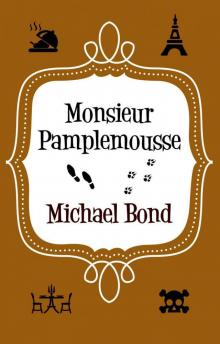 Monsieur Pamplemousse (Monsieur Pamplemousse Series)
Monsieur Pamplemousse (Monsieur Pamplemousse Series) Paddington Here and Now
Paddington Here and Now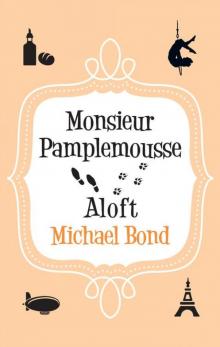 Monsieur Pamplemousse Aloft
Monsieur Pamplemousse Aloft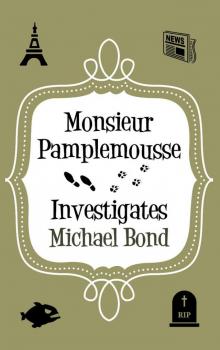 Monsieur Pamplemousse Investigates
Monsieur Pamplemousse Investigates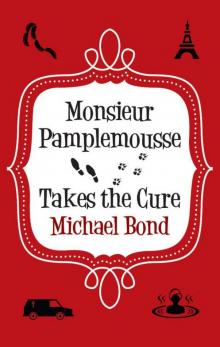 Monsieur Pamplemousse Takes the Cure
Monsieur Pamplemousse Takes the Cure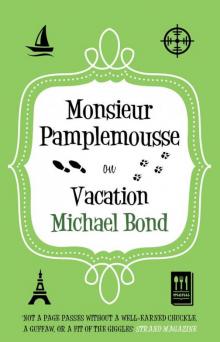 Monsieur Pamplemousse on Vacation
Monsieur Pamplemousse on Vacation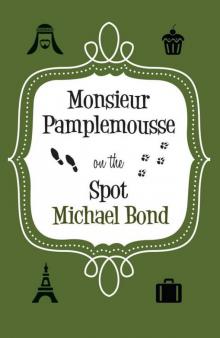 Monsieur Pamplemousse on the Spot
Monsieur Pamplemousse on the Spot Monsieur Pamplemousse Hits the Headlines
Monsieur Pamplemousse Hits the Headlines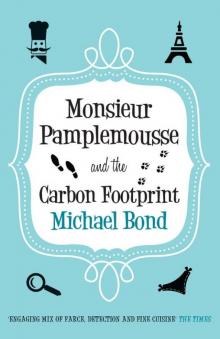 Monsieur Pamplemousse and the Carbon Footprint
Monsieur Pamplemousse and the Carbon Footprint Love from Paddington
Love from Paddington Paddington’s Finest Hour
Paddington’s Finest Hour Paddington Complete Novels
Paddington Complete Novels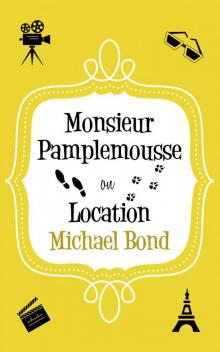 Monsieur Pamplemousse On Location
Monsieur Pamplemousse On Location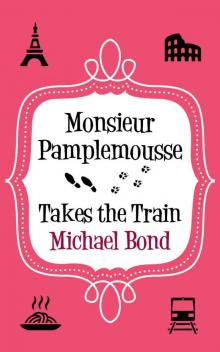 Monsieur Pamplemousse Takes the Train
Monsieur Pamplemousse Takes the Train It Wasn’t Me!
It Wasn’t Me! Paddington Races Ahead
Paddington Races Ahead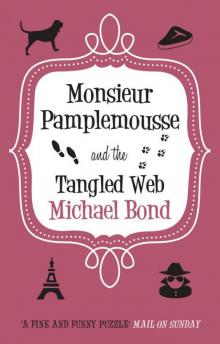 Monsieur Pamplemousse and the Tangled Web
Monsieur Pamplemousse and the Tangled Web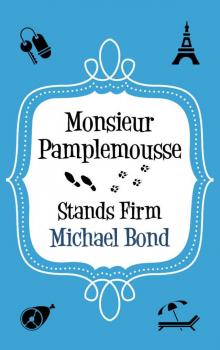 Monsieur Pamplemousse Stands Firm
Monsieur Pamplemousse Stands Firm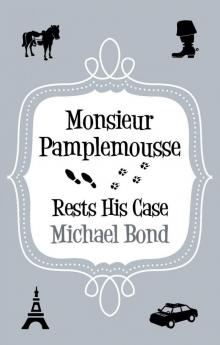 Monsieur Pamplemousse Rests His Case
Monsieur Pamplemousse Rests His Case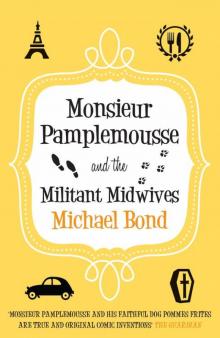 Monsieur Pamplemousse and the Militant Midwives
Monsieur Pamplemousse and the Militant Midwives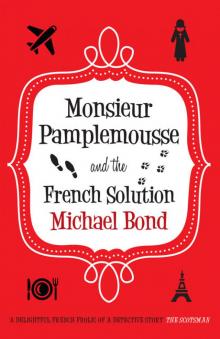 Monsieur Pamplemousse and the French Solution
Monsieur Pamplemousse and the French Solution Paddington Helps Out
Paddington Helps Out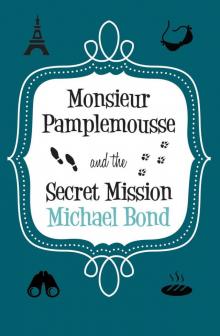 Monsieur Pamplemousse & the Secret Mission (Monsieur Pamplemousse Series)
Monsieur Pamplemousse & the Secret Mission (Monsieur Pamplemousse Series)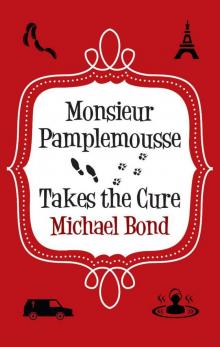 Monsieur Pamplemousse Takes the Cure (Monsieur Pamplemousse Series)
Monsieur Pamplemousse Takes the Cure (Monsieur Pamplemousse Series) A Bear Called Paddington
A Bear Called Paddington